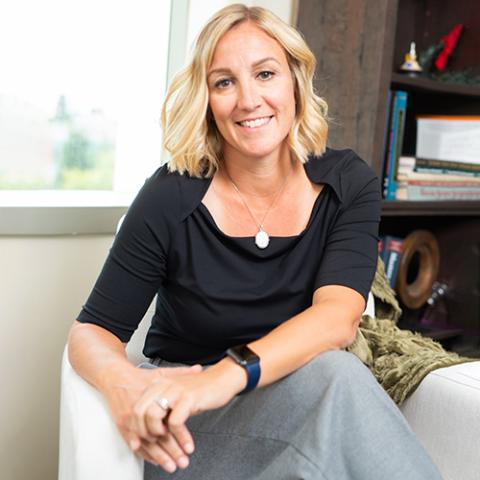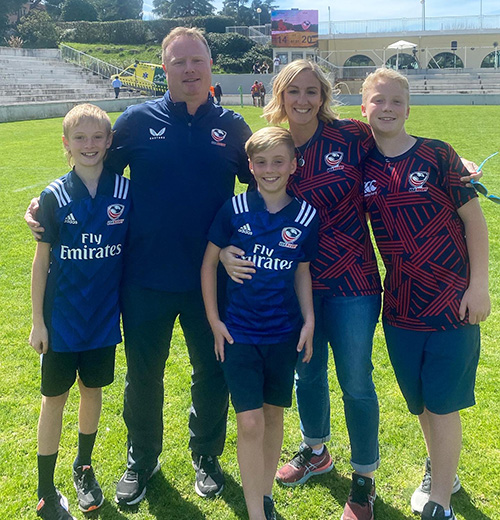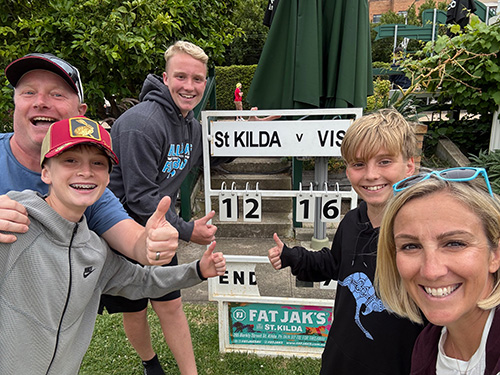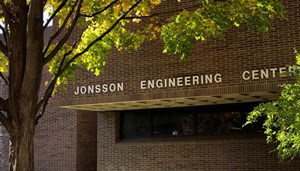
From Athletic Fields to Advancing Women’s Health – A Journey of Creativity, Teamwork, and Resilience
Tell us briefly about yourself.
I grew up locally in a very small town, Speigletown, that sits right between Troy and Schaghticoke. I come from several generations of dairy farmers and as a quintessential tomboy, I spent most of my childhood outdoors, whether I was working on the farm, playing sports or simply exploring the land around me.
From an early age, I had a strong passion for science and math, with a particular fascination for medicine. My dad started working at RPI when I was very young, so campus was a familiar place for me. We would often go to hockey games, and I even spent several summers working at RPI painting dorm rooms for the incoming students.
While I initially envisioned a career in medicine, that shifted when a high school science teacher suggested engineering. We talked about the many different disciplines within engineering, and I realized I didn’t need to be a doctor to contribute to the medical field. At that point RPI was really the only logical choice!
What was your RPI experience like?
Like many other freshmen who eased through high school, I was challenged by academics for the first time in my life at RPI. It was intimidating at first, but luckily I didn’t have to face that transition alone. Athletics played a significant role in helping my adjustment and my overall experience at RPI.
Being a part of the soccer team was a top priority for me and made the transition to college much smoother. Moving onto campus early gave me a head start, and meeting my new teammates, some of whom I had played against locally, made me realize I wasn’t in this alone.
Committing to a team also meant committing to organizing my time and class schedule wisely. That usually meant choosing the earlier classes so I could attend practices and late-night study session after practice. Sundays were often spent in the Student Union studying and getting ahead for the week. Life as a student athlete meant learning good time management skills.
On top of 4 years of soccer at RPI, sophomore year I also discovered rugby, and I quickly fell in love with the sport! It was like nothing I had ever experienced before, and I continued to play even after RPI.
I can’t say enough about being part of a team. It is a formative experience and the skills you learn translate into every facet of life. Communication, accountability, showing up not just for yourself, but for the team around you. I was fortunate enough to be captain my senior year which adds a deeper layer of leadership. You’re responsible for setting the tone, motivating your teammates, leading by example, sometimes managing different personalities, or individual strengths. All of which translates directly into leadership roles in the workplace. I had the privilege of learning from amazing captains the years before me, and their influence helped shape the kind of leader I aimed to be. Years later, I don’t remember the scores of individual games, but I vividly remember the rituals and culture we built together. For us that meant pregame players only whiteboard sessions filled with stick figure drawings capturing everyone’s individual strengths and nicknames, our captains having perfectly timed inspirational quotes to share as we circled up before a game, and of course our eclectic warmup playlist and the few songs that always made the yearly cut. Those traditions built connection, identity, and sense of belonging.
Did RPI education/experience prepare you for success in your career?
When I’m asked about the transition from college to the professional world, I often tell young adults that employers don’t expect you to know every detail of the job from day one. But they do expect you to learn quickly and adapt. That was one of the most valuable lessons I took from RPI. I was constantly challenged with new concepts and rigorous coursework. It was much harder than I expected it to be, but I learned resilience and how to push forward even when I felt overwhelmed.
While the academic foundation in engineering principles and design was strong, the most important takeaway was learning how to approach difficult problems creatively and find practical solutions. That built a mindset of persistence and adaptability which has been instrumental in my success. I like to say you have to get comfortable being uncomfortable.
You are the chief operating officer of a medical device company. How did you get there? Why is this work important? What excites you about your work?
My first job out of RPI was with a large company which was a great environment for learning the fundamentals of medical device development in a very structured, robust way. It also provided the opportunity to explore various departments as my interest evolved.
My next move, into consulting, introduced me to a very different world. For nearly a decade, I worked with a wide range of clients, from Fortune 500 companies to small startups. They were all working to bring new medical devices to market, but often via very different paths. I was able to apply my foundational experiences and learned where to adapt and be flexible in the development process, while still meeting the FDAs requirements. There are many different ways to accomplish a goal and consulting challenged my creativity.
Throughout my time consulting, I took on several different roles, moved into management, and ultimately was offered the opportunity to move out to the Bay Area and take on my first operations position. That was really a turning point for me, and it didn’t take long to decide to jump into the startup world full-time. Startups bring a unique set of challenges. Not only are you focused on developing a high-quality product, but also navigating fundraising, scaling teams, and building a strong, sustainable company from the ground up. Every day is different, and the pace is intense, but I’ve found that my foundation in engineering coursework and the discipline I developed as a student-athlete prepared me well. The ability to problem-solve under pressure, collaborate with diverse teams, stay resilient through setbacks, and motivate my team has been invaluable.
In my current role, I’m excited to see that there has been a long overdue shift in focus on women’s health. Today there is growing recognition that women’s health is not a niche field just focused on reproductive care, but an expansive field touching every aspect of medicine. The shift has sparked increased funding, research, and innovation focused in areas such as cardiovascular health, autoimmune conditions and beyond. We’re beginning to see more tailored solutions, better diagnostics and an inclusive approach to care, taking into account the unique biology of women. It’s an exciting time to be part of this movement and I’m looking forward to continuing my work to drive meaningful improvements in women’s health outcomes.
You are a mother and successful professional. How do you do it all? What is your advice to students at RPI, especially women students?
 I have 3 amazing boys and life is wonderfully chaotic. They all have their own interests and are involved in several different sports teams so evenings and weekends often feel like I have a full-time job as a glorified taxi driver. I’m fortunate to be at a point in my career where I can be flexible with my work schedule, but I have always had an incredible partner in my husband. We truly operate as a team, finding ways to share the load and support each other. Often that means I leave the house early, before everyone is awake, to get a head start on my day while he handles the morning routine. That allows me to get home to manage most of the evening load while he wraps up his day. And of course, we have several carpools with friends and teammates.
I have 3 amazing boys and life is wonderfully chaotic. They all have their own interests and are involved in several different sports teams so evenings and weekends often feel like I have a full-time job as a glorified taxi driver. I’m fortunate to be at a point in my career where I can be flexible with my work schedule, but I have always had an incredible partner in my husband. We truly operate as a team, finding ways to share the load and support each other. Often that means I leave the house early, before everyone is awake, to get a head start on my day while he handles the morning routine. That allows me to get home to manage most of the evening load while he wraps up his day. And of course, we have several carpools with friends and teammates.
I guess the key here is to know you shouldn’t be expected to do it all alone. We aren’t superhuman. Having it all doesn’t mean doing it all yourself, it means building your support system. Just like in college where you had practice with your team or studied with a group of classmates, community and collaboration are a huge part of success.
What do you do for fun?
 My husband Richard and I met playing rugby not long after I graduated from RPI, so rugby has always played a significant role in our lives. We both played for years and while I retired to become a mom, he eventually moved into coaching full-time. He is the Director of Rugby at Stanford and also coached the USA Women’s National Team for many years, so you can imagine many of our travel destinations revolved around catching a match whether he is coaching or just a spectator. We’ve been to more games than I can count, here and abroad - San Diego, Colorado, England, Ireland, Australia, Spain. And of course, all 3 of our boys also play rugby (among other sports) so I still spend much of my time on the side of a pitch. I loved coaching them when they were younger but have transitioned into your typical parent spectator these days.
My husband Richard and I met playing rugby not long after I graduated from RPI, so rugby has always played a significant role in our lives. We both played for years and while I retired to become a mom, he eventually moved into coaching full-time. He is the Director of Rugby at Stanford and also coached the USA Women’s National Team for many years, so you can imagine many of our travel destinations revolved around catching a match whether he is coaching or just a spectator. We’ve been to more games than I can count, here and abroad - San Diego, Colorado, England, Ireland, Australia, Spain. And of course, all 3 of our boys also play rugby (among other sports) so I still spend much of my time on the side of a pitch. I loved coaching them when they were younger but have transitioned into your typical parent spectator these days.
If we aren’t at a sporting event, we also love to explore new places, enjoy the food and culture, and get outside for some amazing hikes in nature.
